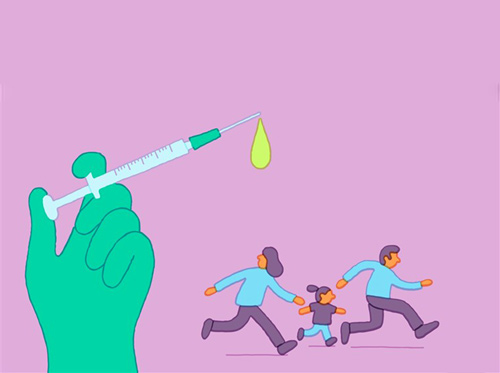By Sonja Haller
No one particularly likes getting a shot. Though parents know children who are terrified by the mere thought of needles.
This makes going to the doctor or the pharmacy for the annual flu shot anywhere from a rocky blip to a full-on nightmare.
Luckily, parents aren’t powerless.
What parents do before and during the appointment can help calm a child, ease the fear and change a kid’s outlook for future vaccinations.
“I’ve never met a child who is excited about needles,” said Dr Jean Moorjani, a paediatrician at Orlando Health Arnold Palmer Hospital. “The best thing parents can do is talk their child through it. I’ve got two kids and I validate their fears. Yes, this is going to hurt. But explain what it’s for and why it’s important.”
Here’s seven more tips for helping kids who fear needles. And, hey, they might work on you too.
Be honest
Babies might not remember the pain, but older children will, Moorjani said.
“They look to parents as somebody to trust and when you say it will hurt but not for very long, they want to believe you,” she said.
Give advance warning
A little advance warning is good thing. No child should be surprised that a hurtful shot is happening or else they’ll learn to fear medical settings. Give just enough information so that a child knows what to expect.
Stick to the vaccine schedule
If you’re playing vaccine catch up, that could mean more shots in a single visit. Sometimes it can’t be avoided for smaller children, but don’t go in for a flu shot and have your doctor realize your 12-year-old missed their Tdap shot so they’re getting that one, too.
Try the cough trick
For unclear reasons, studies found children ages four to 11, who coughed moderately once before a shot and once during it, found the pain of a needle reduced.
Follow medical staff instructions
Some children are chill and sit on the table by themselves. Some want to be in our lap. And some make getting a shot impossible by hanging onto us for dear life, wailing like a banshee. Try as we might to calm our child, our presence may only be prolonging our child’s scary experience. Medical professionals may ask us to step aside so they can get the shot over with. Do it.
Ready a reward
Children never outgrow rewards do they? Often times doctor’s offices have a sticker or a bauble waiting after a shot, but it never hurts to dangle the carrot or sucker or whatever else is your child’s favourite reward for his or her bravery after the shot.
Work to overcome a needle phobia
Needle phobia is real. When a child’s fear of needles goes to the extreme so that he or she is missing vaccinations, a counsellor or child psychologist can help. Often the treatment leans toward exposure exercises to the type of experiences a child will go through during a vaccination until the child is ready for a shot.
